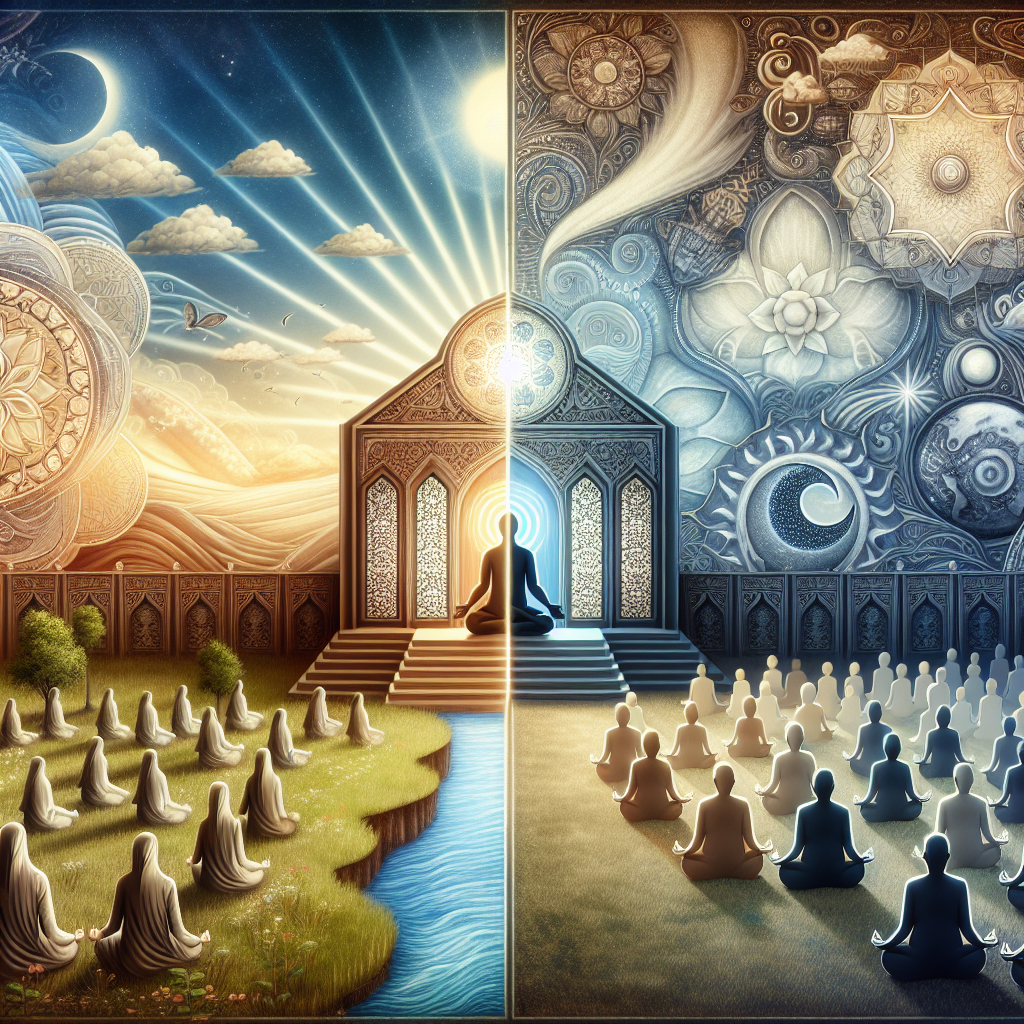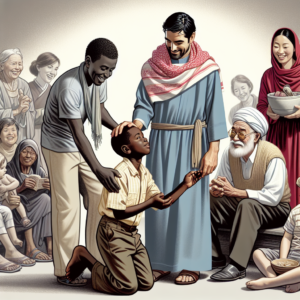Spiritual Devotional about Spirituality vs. Religion
Spirituality Vs. Religion: Discovering Two Distinctive Paths of Inner Enlightenment
Have you ever pondered the difference between spirituality and religion? The two inherently connected yet unique paradigms that coexist in the realm of faith, belief, and personal growth.
The Definition Conundrum
Commonly interchanged, mixed up and merged, the difference between spirituality and religion often confuses people. Recognizing the uniqueness yet similarity of these concepts can be both fascinating and enlightening. It offers an intimate lens to view life, self, and everything beyond.
Spirituality: The Self-Driven Journey
Spirituality, undeniably, is a personal journey. It focuses on the individual connection with the self and the universe. It is shaped by personal experiences, thoughts, feelings, and the individual’s perspective of self-discovery. The path of spirituality fosters a sense of peace, purpose, and interconnectedness. It encourages growth, acceptance, and the quest towards inner harmony.
Religion: The Structured Path
Religion, on the other hand, is an organized belief system articulated through specific rituals, doctrines, and religious scriptures. It often involves a sense of community, shared beliefs, and collective worship. Predominantly, it provides a defined path guided by the teachings of spiritual gurus, religious texts, or deities.
Intersecting Yet Independent
The differences are clear, yet the lines intersect at several junctures. Both spirituality and religion aim towards fostering a sense of purpose, a deeper understanding of the self and the universe. They both inspire followers to seek solace, attain peace, express gratitude, and strive for goodness. Yet, they remain unique and independent in their approach towards achieving these goals.
The Personal Choice
Your choice between religion and spirituality falls to a matter of personal preference. You might find your spiritual self aligning to religion or prefer to journey independently along the spiritual path. No pathway is superior or inferior. It’s about finding what resonates with your soul and leads you towards deep personal growth, self-discovery, and enlightenment.
The beauty lies in the variety, in the freedom of choice, and the multiple ways to connect to a higher power, and ultimately, to oneself. So, whether you follow the path of spirituality, religion, or a fusion of both, remember, the goal remains the same: to seek, to grow, to understand, to love, and to live a life of purpose, peace, and positivity.
Final Thoughts
Whether you’re drawn towards spirituality or religion, the quest is a personal one. Stick to the path that you believe will foster your growth, feed your soul, and bring you closer to the truth you are seeking. The essence of your journey should be your deeper connection with your inner self and the universe beyond. Wishing you the best on your path of discovery!
“Your sacred space is where you can find yourself again and again.” – Joseph Campbell
[email-subscribers-form id=”1″]
Q&A about Spirituality vs. Religion
Q: What is the main difference between spirituality and religion?
A: Spirituality tends to be a personal experience, often individual and subjective, while religion typically involves structured practices and doctrines shared among a community or group of people.
Q: How does spirituality relate to religion?
A: Spirituality can exist within the framework of religion, but it doesn’t have to. Some people consider themselves spiritual but not religious, meaning they might engage in spiritual practices or believe in a higher power without subscribing to a specific religious institution or doctrine.
Q: Do you have to belong to a religious community to be spiritual?
A: No, spirituality is personal and thus doesn’t require the involvement in a specific religious community. It’s about personal growth, finding inner peace, and understanding life on a deeper level.
Q: Can you be religious and not spiritual?
A: Technically, yes. This typically happens when someone follows the practices, rules, and cultural aspects of a religion without engaging in the personal exploration of faith or spiritual connection, or without having a personal relationship to the divine.
Q: How does one’s view on morality differ between being spiritual and being religious?
A: For religious individuals, moral guidelines are often dictated by their religious doctrines or texts. However, for spiritual people, morality is typically a subjective pursuit, based on personal growth, inner values, and perceived interconnectedness.
Q: Do spirituality and religion approach the concept of God in the same way?
A: Not necessarily. Religion generally offers a specific interpretation of God or gods, conveyed through scripture or tradition. Spirituality, however, allows for more personal interpretations of the divine, which can vary greatly from person to person.
Q: Can spirituality and religion coexist in a person’s belief system?
A: Yes, many people identify as both religious and spiritual. They may partake in organized religion while also personalizing their experiences in a manner that enhances their spiritual understanding and personal growth.
Q: How does the method of worship differentiate between spirituality and religion?
A: Religious worship often occurs in a communal setting, using defined rituals and ceremonies. Spiritual worship is more flexible and personal, and can include meditation, nature walks, personal reflection, or any other activity that helps an individual feel connected to the universe or a higher power.



